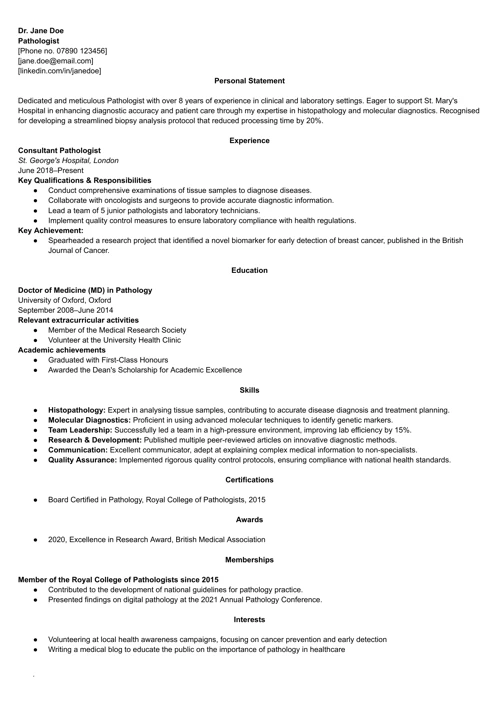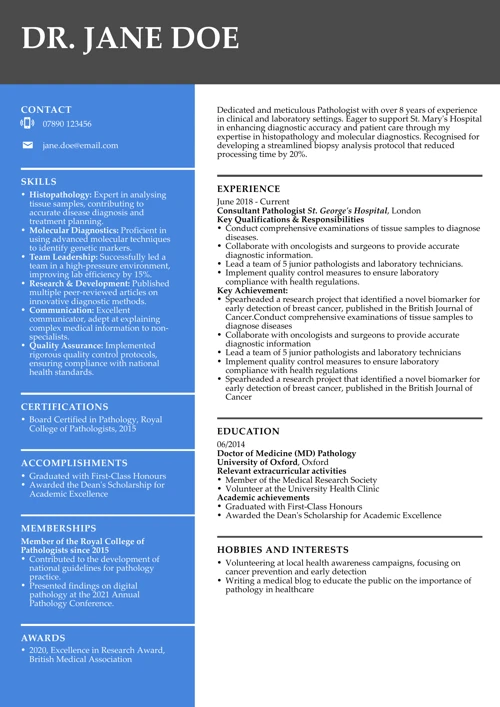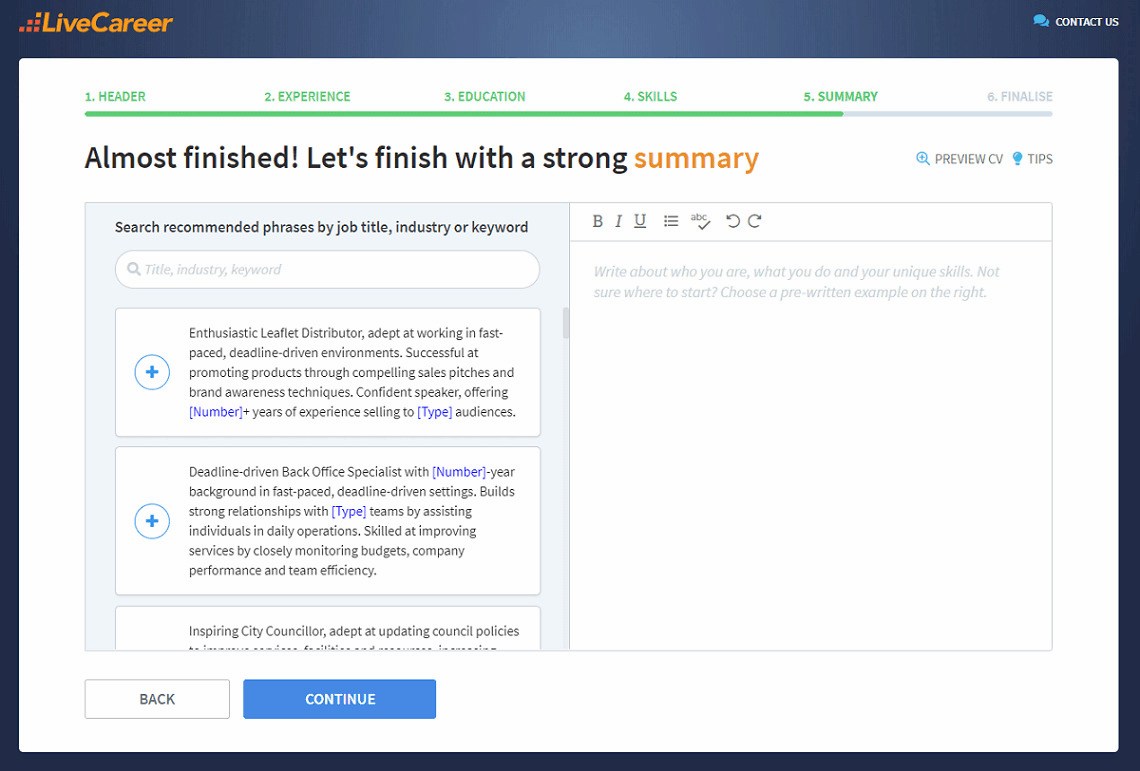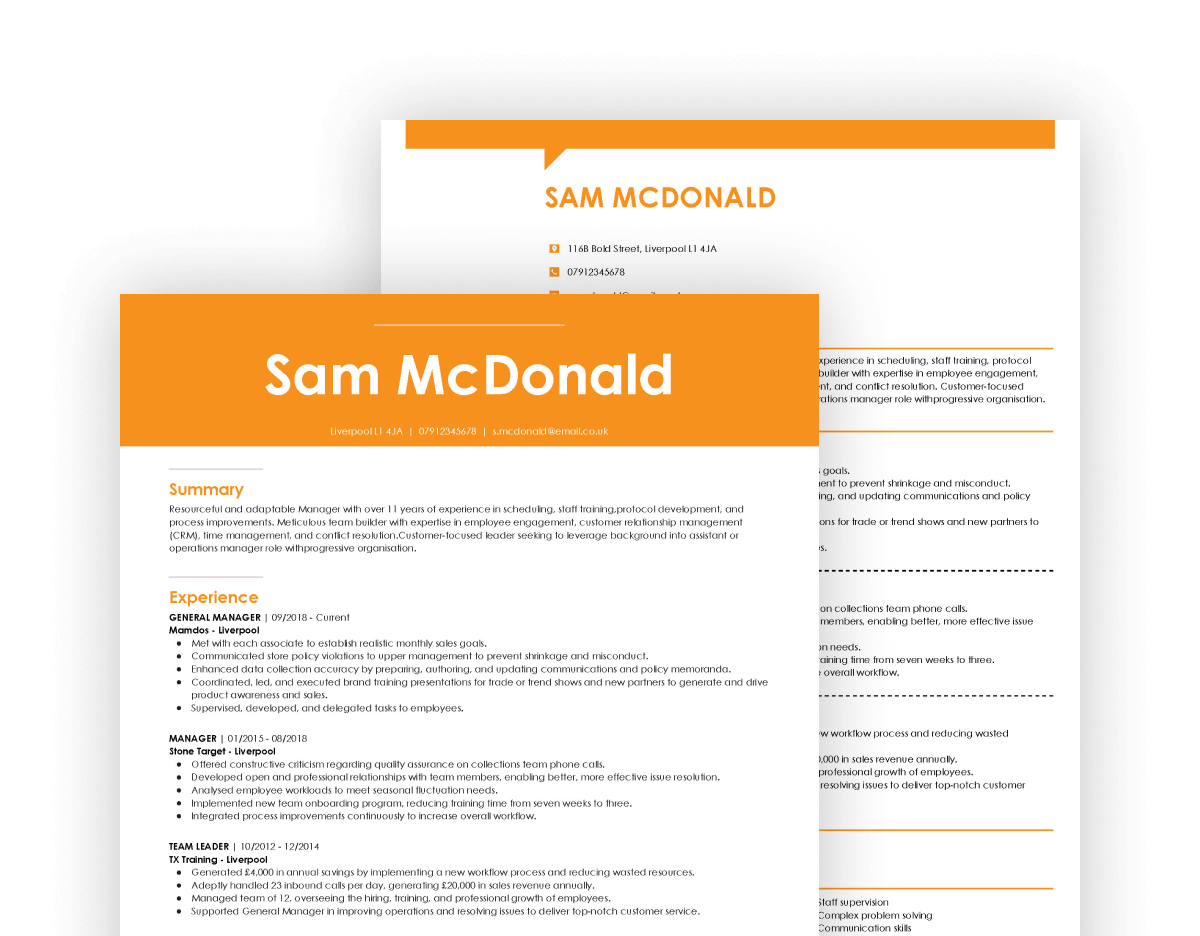Create a professional CV now!
 NO
NO YES
YESOur customers were hired by:
Pathologists are integral to the healthcare system, providing vital diagnostic insights that shape treatment plans by analysing tissues and fluids. To effectively convey your unique skills and experiences in this specialised domain, a well-crafted pathologist CV is essential. This article offers expert advice on creating a CV for pathology professionals, complete with tailored examples to ensure your expertise shines and captures the attention of prospective employers.
Create an effective CV in minutes. Choose a professional CV template and fill in every section of your CV in a flash using ready-made content and expert tips.
Create a professional CV now!
 NO
NO YES
YESWe created the sample on the right using our builder. See other good CV examples like this one.
Save a lot of time—just copy this pathology CV template and use our tips to adjust it to your needs:
Dr. Jane Doe
Pathologist
[Phone no. 07890 123456]
[jane.doe@email.com]
[linkedin.com/in/janedoe]
Personal Statement
Dedicated and meticulous Pathologist with over 8 years of experience in clinical and laboratory settings. Eager to support St. Mary's Hospital in enhancing diagnostic accuracy and patient care through my expertise in histopathology and molecular diagnostics. Recognised for developing a streamlined biopsy analysis protocol that reduced processing time by 20%.
Experience
Consultant Pathologist
St. George's Hospital, London
June 2018–Present
Key Qualifications & Responsibilities
Key Achievement:
Education
Doctor of Medicine (MD) in Pathology
University of Oxford, Oxford
September 2008–June 2014
Relevant extracurricular activities
Academic achievements
Skills
Certifications
Awards
Memberships
Member of the Royal College of Pathologists since 2015
Interests
This sample pathologist CV highlights professional qualities by detailing relevant experiences. Starting with a personal statement, it shows the unique advantages the candidate brings to the employer. By following this strategy, your pathologist CV will stand out from the crowd, enhancing your appeal to hospital or clinic recruiters.
Here are five key tips, drawn from the insights of experienced pathologists, to craft a CV that captures the attention of employers in the medical field:
By incorporating these tips, you can create a strong CV for pathologist roles. If it’s been a while since you last updated your CV, you might want to refresh your understanding of CV-writing basics.
Here’s a quick writing guide to help you prepare a pathologist CV:
With numerous opportunities available in the medical sector, you might find yourself applying to various positions. It's useful to have a general CV that can be tailored for each application. However, much like personalised patient care, a generic application simply won't suffice.
These tips will help you target your pathologist CV for a specific position, allowing you to tailor your application effectively:
The organisation of your CV is as vital as a well-organised laboratory. Avoid random placements. Follow this sequence: header, personal statement, work history, education, skills, and additional sections. Arrange your experiences in reverse chronological order. If you’re composing a CV with no experience, you may prioritise education over work history.
Recruiters and applicant tracking systems favour simple CV templates. Your pathologist CV should prioritise clarity over intricate designs. Maintain 1-inch margins, and use 1–1.15 line spacing for readability. Choose traditional CV fonts such as Times New Roman or Calibri, with font sizes set to 11–12 for content and 13–14 for headings. Once your pathologist CV is complete, save it as a PDF unless another format is specified by the application system.
Your personal statement is an ideal place to express why you’re a strong fit for the role you’re applying for. An effective CV introduction not only showcases your scientific knowledge but also presents personal traits. Capture the hiring manager’s attention by mentioning an accomplishment in pathology, and tailoring your statement to the position. Keep it concise in 3–4 sentences.
A strong CV summary will convince the recruiter you’re the perfect candidate. Save time and choose a ready-made personal statement written by career experts and adjust it to your needs in the LiveCareer CV builder.

Effectively communicating your ability to perform job duties is crucial for recruiters evaluating your pathologist CV. The work experience section of your CV should clearly demonstrate your proficiency in handling diagnostic tasks, collaborating with healthcare teams, and upholding laboratory standards. Use 3–5 bullet points to highlight your competency in pathology-related responsibilities and include a significant achievement you’re proud of. Start each bullet with a powerful action verb for a CV to increase impact.
Even if you lack direct experience in pathology, you may still possess relevant skills. Part-time roles, internships, or research projects could involve transferable responsibilities. Consider creating a skills-based CV to prominently feature such qualifications in your application.
We’ve compiled a list of unique professional accomplishments for a pathologist CV to guide you:
Professional duties & achievements for a pathologist CV—examples
Possessing a relevant university degree can significantly enhance your prospects for career advancement beyond entry-level pathologist roles. Begin with your highest qualification and list subsequent credentials in reverse chronological order. Fill the education section of your CV with pertinent coursework and extracurricular activities that demonstrate your competencies.
Showcasing your competencies effectively on a pathologist CV is crucial; a mere list of random skills won't suffice. Instead, align your skills with the job requirements and provide context that illustrates your professional approach.
A pathologist's skill set should comprise both soft skills and hard skills, such as analytical skills, critical thinking, attention to detail, and proficiency in laboratory techniques and diagnostic procedures. Carefully review the job listing to ensure all essential skills are highlighted on your CV, showcasing your readiness for the role.
Additional CV sections can significantly strengthen your application. These sections provide an opportunity to showcase unique qualifications that set you apart from other candidates.
Your options extend beyond professional certifications or licences. For instance, proficiency in foreign languages can be advantageous for pathologists working in multicultural environments or locations with diverse populations. Moreover, including relevant industry knowledge in the hobbies and interests section can further enhance your pathologist CV and make it more appealing to potential employers.
A job application isn’t complete without a cover letter that expands on the information from the CV.Make your cover letter personal by expressing your genuine interest in the position. Follow the introduction with an overview of your qualifications and key strengths, and conclude the letter by explaining how they’ll benefit from hiring you. Propose a meeting or a phone call, and sign off professionally.
You don’t have to be a CV writing expert. In the LiveCareer CV builder you’ll find ready-made content for every industry and position, which you can then add with a single click.

Applying for other jobs? Try these CV examples as well:
Creating an impactful pathologist CV requires attention to detail and a strategic approach. By following these tips, you can enhance your chances of securing the position you desire.
Thank you for taking the time to explore this guide on crafting a pathologist CV. We appreciate your interest and invite you to leave any questions or comments below.
Our editorial team has reviewed this article for compliance with Livecareer’s editorial guidelines. It’s to ensure that our expert advice and recommendations are consistent across all our career guides and align with current CV and cover letter writing standards and trends. We’re trusted by over 10 million job seekers, supporting them on their way to finding their dream job. Each article is preceded by research and scrutiny to ensure our content responds to current market trends and demand.
About the author
Since 2013, the LiveCareer UK team has shared the best advice to help you advance your career. Experts from our UK editorial team have written more than one hundred guides on how to write the perfect CV or cover letter.
Rate this article:
Pathologist cv
Average:


Writing an academic CV requires a focus on showcasing your academic and professional accomplishments. Here's a step-by-step guide on how to create it to continue your research.

How to make a PhD application CV that entices reviewers and secures your spot in the academic spotlight? Get the answers with a PhD CV example & tips.

Land your dream role with a top-notch CV for physician assistant positions. This guide offers an inspiring physician assistant CV sample and expert tips.
Our customers were hired by: